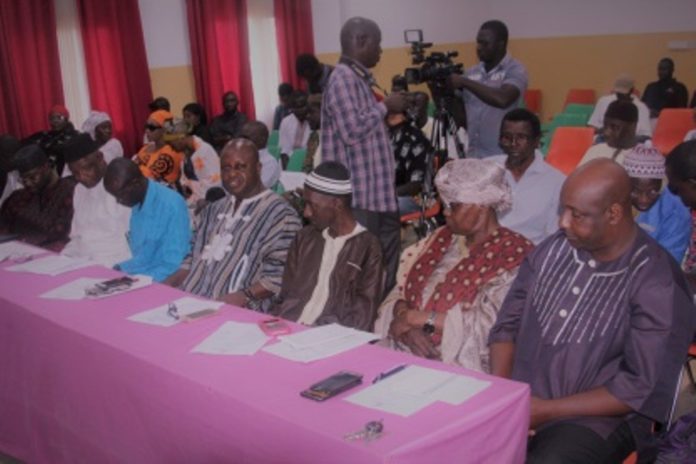By Yankuba Jallow
The Constitutional Review Commission (CRC) on Saturday May 18th 2019, continued their engagement with political parties to hear and receive their comments and contributions on the new Constitution, as part of their public consultation with the citizenry. The CRC which is mandated by an Act of the National Assembly, is to prepare a draft Constitution for the country.
All the parties that attended, agreed in principle on the following: two-term limit for the office of the President, and an assets declaration by the President. The majority opined that a President should disclose gifts he or she receives on behalf of the state, and should not engage in business; that no association or group should be named after a serving president. The majority of those who attended opined that local languages should be used at the National Assembly; that there should be proportional representation where women, differently abled persons among others, will be represented.
It was also raised that the Gambian-Diaspora to be allowed to vote. Almost all the political party representatives agreed that the President should not nominate members of the National Assembly. It was suggested that any member who cross-carpets, should lose their seats.
Another recommendation was made for absolute majority rule to apply during elections. Some opined that Chiefs should be elected and Governors should be apolitical, because they are civil servants. There was divided opinion as to whether prisoners should vote or not.
Comments were raised that persons born in the Gambia, should automatically become citizens by birth.
The majority opined that the death penalty should be revoked and substituted with life imprisonment.
Dr. Samba Sabally, a representative of the Gambia Democratic Congress (GDC), said the new Constitution should make provision for no nominated National Assembly Members (NAM); that the Speaker and the Deputy Speaker should be elected from among elected members.
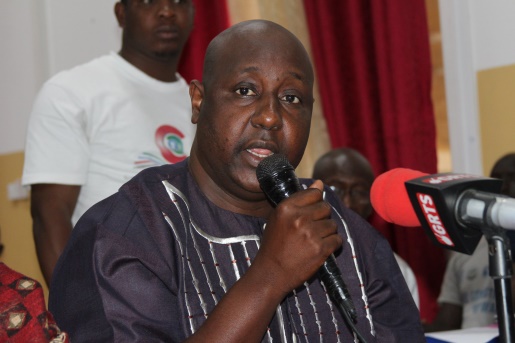
He said the educational requirement for members of the National Assembly should remain as it is in the 1997 Constitution adding that dual citizens should not be disqualified from contesting in National Assembly (NA) elections. Dr. Sabally suggested that any person who cross-carpets whilst being a member of the NA, should lose his or her seat. He called on the CRC to make provision for recall of NAMs in the new Constitution adding that the presidential system is suitable for The Gambia. He said the lower age limit for the President should be 30 years and there should not be any upper age limit. He opined that dual citizenship should be allowed to vote notwithstanding, the person has to be born in The Gambia.
Amie Sillah of the PDOIS in her contribution said the President should not be allowed to nominate any member of the National Assembly; that instead this should be done by interest groups. She said the educational requirement for the President should be maintained at grade 12; that the lower age limit for the office of President should be 30 years and the upper age limit should be 90 years, if the person is capable or as long as the person could serve. “The dual citizen should not be discriminated. The Diaspora should be allowed to contest in our elections but after the elections, the person has to choose one of his or her citizenship,” she said.
She said at the NA, the English Language should be used adding that local languages could be used with time, so that the people being represented will be able to hear what their representatives say.
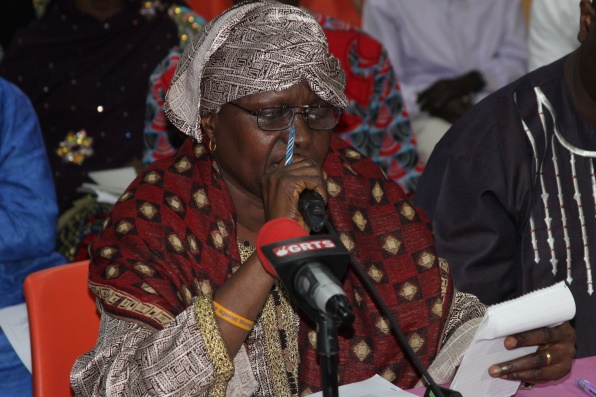
Duta Kamaso, a representative of the PPP said the one-year requirement for NAMs should be maintained; that the lower and upper age limit for NAMs should be 30 and 75 years respectively. She opined that 40% of the members of the NA should be women.
Suwaibou Touray, a representative of the PDOIS said the president should not have the powers to nominate any member of the NA because it does not enhance democracy. Like Amie Sillah, Touray opined that marginalized groups should be catered for through proportional representation.
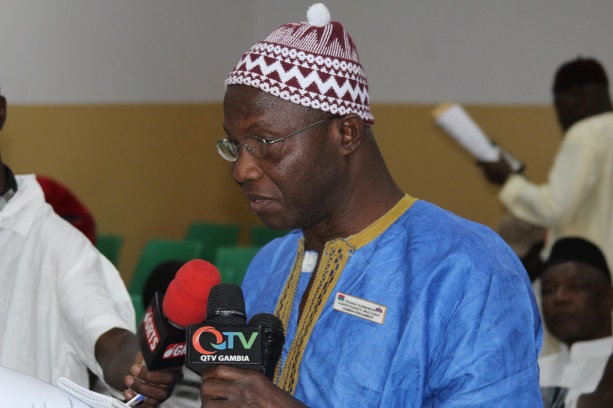
On cross-carpet by a member of the National Assembly, Touray said the person must not be denied his or her right to contest in a bye-elections; that each and every citizen should have a right to potable water supply. Touray told Commissioners that Chiefs should not have dual functions of becoming Magistrates and custodians of the traditions of their people. He said each district should have their Magistrate and the Chief should only have the function of being the custodian of the tradition of their people.
Ousainou Darboe, of the UDP said the Speaker should be nominated and should not be from the elected members. Darboe opined that elected members are required to represent their constituency and therefore, making one of them the Speaker of the NA, will give them two functions; that the elected members are elected on party tickets and making them the Speaker of the NA may be influenced by their party affiliation. He said as a nominated member, the Speaker owes no party loyalty; that there should be a Council responsible for nominating the Speaker of the NA.
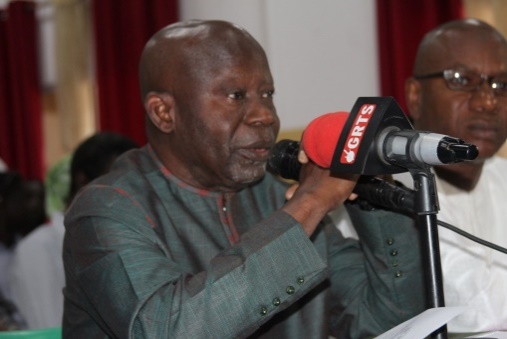
He said residing in The Gambia should be a requirement for candidates contesting in elections, although he said constituency residency should not be a requirement. He stated that Gambians living in the Diaspora should reside in The Gambia so that the people will have confidence in them before they contest in elections.
“Let us confine our elections to people residing in The Gambia and you must fulfil the residential requirement before becoming eligible to contest in the elections,” Darboe told the CRC.
He said other countries have paramount Chiefs. He called on the CRC to make provision for such; that there should be paramount Chiefs for Foni, Jarra, Sami among others.
On the election of Chiefs, Darboe said even if they are elected on non-partisan politics, partisan politics will come into play in Chiefs’ lives. On citizenship, Darboe said citizenship by naturalization should be seven years and that of marriage should be three.
Suwaibou Touray on the other hand submitted that there are Gambians all over the world; that for this reason, residential requirement as a qualification or requirement before one becomes a President or member of the NA, is not a good requirement; that it means the Gambians living or working in other parts of the world are required to abandon their lives abroad, before becoming eligible to vote.
Darboe on the other hand opined that election of President and National Assembly Members should be held on the same day. He said he is against the notion that 40% of Members of the NA should be from marginalized groups; that not all parties will have the resources and candidates to contest in all constituencies; that there are parties that may not be able to put up candidates in all constituencies in the country. “Proportional representation should be for the Executive and not the National Assembly,” Darboe said. Commissioner Janet Sallah-Njie however put it to Darboe that it does not matter from which party the 40% of the proportional representation may come; that what matters is the 40% representation of marginalized groups. On the use of local languages at the NA, Darboe opined that English Language should be used instead of local languages, because The Gambia does not have a common local language.
On his part, Mai Fatty of the GMC said if there will be nominated members, the new Constitution should clearly spell out where the nominated members will come from. “If you are expelled or have resigned from your party, you should automatically lose your seat,” Fatty said.
He contributed that elections to office of President and the NA, should be held on separate dates; that the use of local languages should be encouraged. He said he is a Muslim and therefore, he will not go against the death penalty to be part of our penal laws. On the election of local authorities, Fatty said he is with the opinion that Gambians should not do away with traditional values. “We should not do away with the good values in our society and should continue to nurture such values. Let us strengthen this and let us not democratize everything. I mean let us not Westernize everything,” he posited.
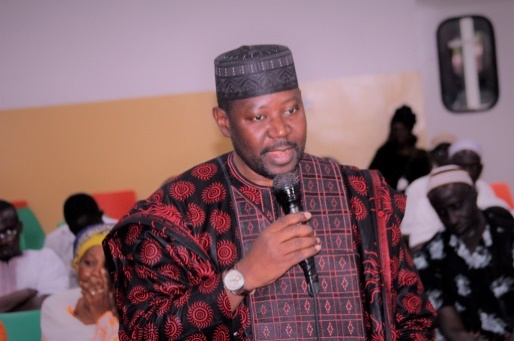
He said his party’s preference is to strengthen traditional institutions first, over elections; that Governors are civil servants and therefore, should be appointed. He said the requirement for citizenship by marriage should be maintained at the current residential requirement of seven years; that before one naturalizes, one must renounce previous citizenship. Fatty said there should be free, accessible basic and secondary education; that higher education should be based on merit. He said basic health care should be free.
Momodou Sidibeh, a GMC representative said Governors should be administrative officers and Chairpersons of Councils should be heads of Regions.
Edrissa Jallow of the PDOIS said prisoners should be allowed to vote. Jallow indicated that prisoners are citizens and prisons are correction centres; that they are sovereign citizens. Jallow said as sovereign citizens, prisoners have the right to determine the manner of their Government and this is what gives them the right to vote. Jallow further opined that Diaspora Gambians should be allowed to vote. He called for the new Constitution to make the Diaspora a constituency for the Gambians. Jallow said Alkalos and Chiefs should be elected. On the issue of the election of Governors, Jallow said they should be civil servants and not politicians; that Governors should not be in competition with Chairperson.
On proportional representation at the NA, Jallow said each party should send the list of their eligible candidates to the IEC; that after elections, the national result will determine the number of representation a party may have in parliament; that thereafter, the IEC will instruct the party to select from various interest groups, their representation in parliament in order for it to be an all-inclusive legislative body.
Papa Njie, of the PPP in his contribution said Chiefs should be elected and Diaspora Gambians should be allowed to vote; that he as well supports the idea of using local languages at the NA. Njie said the elections of President and Members of the NA should be held on the same day, and proposed the need for the new Constitution to give prisoners the right to vote.
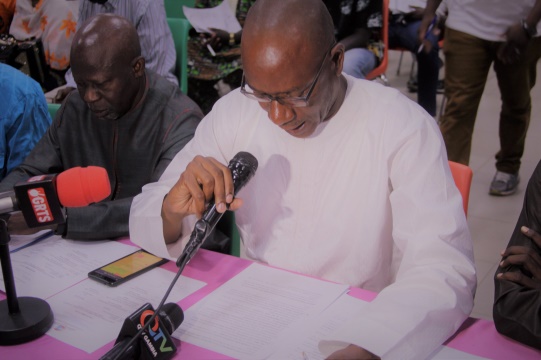
Omar Ceesay of the GDC said the new Constitution should not make any provision for the nomination of NAMs. “Every individual who wins a seat at the National Assembly to represent the people, must have the support of the people before becoming a member of the NA,” he said.
He said the NA has Committees that represent marginalized groups and therefore, the notion that there are marginalized groups is not the reality. He said the lower age limit for NAMs should be 18 years instead of 21; that there should be no percentage for women representation at the NA as the laws provide a level ground for participation for each and every Gambian to contest.
Mam Saye-Njie of the APRC said there should be proportional representation for women, persons with disability and marginalized groups; that the President should not engage in any form of business. She however indicated that the President should not disclose personal gifts given to him/her on behalf of the state; that prisoners should not be allowed to vote. She said the position of Governors should be an elected position; that Chiefs should be elected but Alkalos should be left on the tradition line of selection and should be apolitical. She opined that the Speaker and Deputy Speaker should be elected from elected representatives.
Mariama Jammeh-Ceesay of the NCP said the new Constitution should make provision for nominated members wherein five will be female and two male.
The political parties in attendance were GAP, GDC, PDOIS, APRC, GMC, NRP, PPP, UDP and GPDP. The consultation meeting was held at the NANA Conference Hall in Kanifing.















